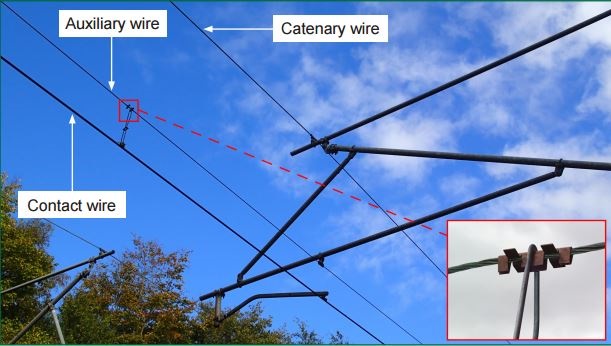26.06.15
RAIB electric shock investigation calls for rule book review
An RAIB safety investigation has called for a review of the rule book on when train crew should leave their cabs after a Virgin Trains driver suffered an electric shock last year.
On the evening of 23 September 2014, the driver suffered a severe electric shock at Sutton Weaver, Cheshire, while assessing damaged overhead line equipment (OLE) on the track.
The driver had stopped his train having seen damaged wires ahead. He called the signaller, left the train and walked along the track ahead to read the OLE structure number, believing it important to accurately describe the location of the fault to assist the OLE maintenance team to fix the infrastructure, and to assist in the recovery of his train.
The rule book also requires him to report any problems or incidents with the OLE to the signaller, including the extent of damage to the OLE and the nearest OLE structure number.
The OLE in this area is constructed to the design known as Mark 1 (Mk 1) compound catenary and became operational on this line in 1962. Unlike more recent designs, which use just two wires running above each track, this design uses three.

However, while on the track, the driver did not see a green auxiliary wire hanging down in front of his train. While walking towards it, he came close to, or made contact with, the hanging wire, which was electrically live.
The electric shock caused severe burns to the right-hand side of the driver’s body. He also suffered broken ribs, a broken collar bone, and a head wound thought to have occurred when he fell and hit his head against a rail. He was in hospital for 10 weeks. Virgin Trains has informed the RAIB that the train driver involved in this accident is making a good recovery.
As a consequence of the investigation, RAIB has recommended that RSSB should review Module AC of the rule book and clarify the actions that train crew should take if they are required to leave their train in situations where the OLE is electrically live, and may possibly be damaged.
Since the incident, Network Rail has conducted a high level intrusive inspection of the auxiliary wire from Weaver to Ditton junctions, in October 2014.
The company is now conducting more detailed inspections of the OLE between Weaver Junction and Wavertree (approximately eight miles of double track and nine miles of quadruple track). This includes inspecting for damage underneath the protective sleeves. As of March 2015, it had replaced six sections of auxiliary wire (by splicing in new wire), two missing protective sleeves, two missing droppers and realigned 450 droppers.
On top of this, Network Rail LNW has identified 28 single track miles of its infrastructure where Mk 1 compound OLE could, if it fails, come into close or actual contact with members of the public, such as adjacent to station platforms. It has told the RAIB it plans to request investment authority to remove the auxiliary wires in these sections so that this can be completed by April 2016.
RAIB stated that Network Rail should revise its work instructions so that inspection staff are aware of what to look for, including possible fatigue damage precursors. It should also produce a plan for the extension of its current detailed examinations of auxiliary wires close to, and within, protective sleeves to identify and rectify broken and damaged wire strands and protective sleeves on all of its Mk 1 compound catenary.
RAIB added the “intent of this recommendation is to minimise the occurrence of broken auxiliary wires on Mk 1 compound catenary OLE to reduce the potential for people to receive electric shocks”.
The RMT praised the actions of the train manager after the accident, having headed straight to the driver’s cab, seen the driver collapsed in the cess and hit the GSM-R red button, bringing all trains to a stop. He used the PA system to ask for a doctor, who came forward and helped give emergency medical assistance to the driver.
RMT general secretary Mick Cash said: “It is crystal clear that it was the presence of mind, the experience and the training of the on-board manager that helped avoid what had the potential to be a major tragedy. Those pushing the case for axing guards, conductors and other members of the train crew should take a look at this incident and the reports and admit that they have got it wrong.
“RMT has been thanked formally by our sister union Aslef for the prompt action of the train manager in this case and we are both pledged to work together to defend the safety-critical role of all of the members of the train team.”